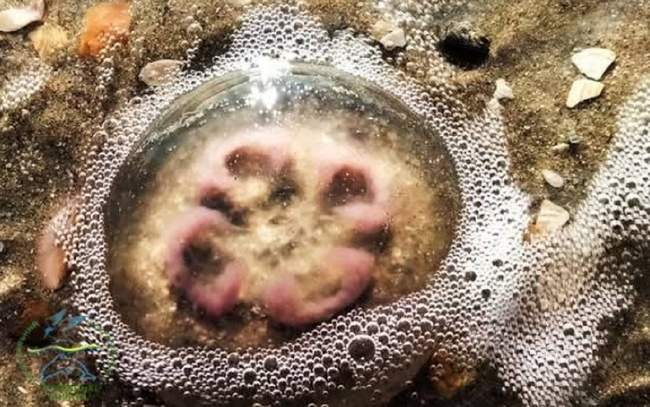Меню
Соціальні мережі
Розділи
Feb. 7, 2025, 10:53 a.m.
Mass Jellyfish Deaths Linked to Fuel Oil Pollution in the Black Sea
This article also available in English663

Photo: Ivan Rusev/Facebook
Environmentalists have been monitoring the fuel oil discharge on the Black Sea coast for three weeks now. During a regular survey, they found a massive death of jellyfish of the aurelia eared species.
This was reported by Ivan Rusev, an employee of the Tuzly Estuaries National Nature Park.
According to him, on a two-kilometer stretch of coastline, 2-3 jellyfish per meter were counted on the sand, and about 5000 individuals in total. There were even more of them in shallow water areas, but it was not possible to count their number.
Aurelia auriculata is one of the jellyfish species that can react to toxic pollution, including neurotoxins, heavy metals, plastic, and oil products. According to Ivan Rusev, the mucus of these jellyfish contains bacteria that absorb hydrocarbons, including crude oil. In addition, the mucus can aggregate oil droplets, helping to naturally purify seawater.
The scientist suggested that jellyfish could consume nanofractions of oil products along with plankton, which could have serious environmental consequences.
Rusev recalled that in 2022, during the full-scale invasion of Russia, the stranding of corneotype jellyfish was associated with large-scale pollution of the Black Sea. This happened after the explosion of the Kakhovka hydroelectric power plant, as well as as a result of the sinking of Russian ships, including the cruiser "Moscow".
Now, according to him, wave processes are already turning jellyfish that have washed ashore into "biological dust" that will enter the food chain of marine and estuarine ecosystems, which could have long-term consequences for aquatic life.
Meanwhile, on the coast near the village of Mykolayivka in the Serhiyivka community of Odesa Oblast, environmentalists have discovered new areas contaminated with fuel oil.
On January 29, utilities in Odesa Oblast began work to clean the coast from oil pollution. Earlier, employees of the Tuzly Estuaries National Park found fuel oil on the park's coast, which they collected and handed over to Vladyslav Balynskyi's private laboratory.
After that, the Commission on Technogenic and Environmental Safety and Emergencies at the Odesa Regional State Administration held an extraordinary meeting.
The accident in the Kerch Strait became known on December 15. The shipwreck occurred near Cape Panagia in the Temryuk district of Krasnodar Krai, in the southwest of the Taman Peninsula, 12 kilometers from the village of Taman. It is the eastern entrance to the Kerch Strait from the Black Sea. According to official data, both tankers could have been carrying about 8,000 tons of oil products.









